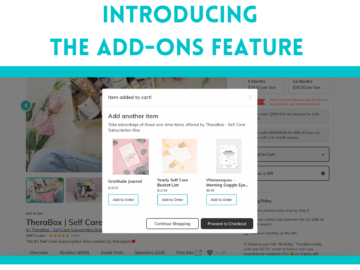You want to know how to paint a perfect painting? It’s easy. Make yourself perfect and then just paint naturally.
– “Zen and the art of Motorcycle Maintenance” by Robert Pirsig
Ideas have always been easy for me. I’ve thought pretty hard about how this isn’t a reality for most people. Why is it so easy for some people and so hard for others?
I think the reason most entrepreneurs have a hard time coming up with good ideas boils down to their thought process. Their thought process more or less looks something like this:
- What do I know something about?
- Can I think of enough new things to buy each month to send out new stuff every month in one of those categories?
- How much do those things cost?
- If I mark that up by 30%, will people buy it?
This is how you should not attempt to invent business ideas. It results in derivative, unsustainable ideas. This process leads you to think there is no more opportunity or that there isn’t a good niche you’re personally able to fill. I call this the “all the good ideas are taken” fallacy.
The “all the good ideas are taken” fallacy is the false belief that there is less opportunity than actually exists.
It is the product of faulty thinking. It’s critical to understand that this fallacy is just not true. Only the obvious ideas ones are taken. It’s the obvious ones that get cloned (and potentially fail) because founders are all going through the flawed process above.
The reason these founders are having a hard time coming up with ideas is because they are thinking about themselves. I don’t mean they are thinking about solving one of their own needs. Solving one of their own needs would be very good, because it’s rooted in a real need. Rather, they are thinking about what they already know, and how they can sell that.
They ask: How hard would it be to acquire the products for a business I’m interested in? What impact will the business have on my life?
Almost always, you can’t start a great company by reasoning backwards from “and then I have a great life.” You have to reason forwards, from a problem or audience you are helping. If you happen to be a member of that audience, then so much the better, but that alone isn’t the best qualifier for a great business idea. So what do you do?
The key to coming up with a great business idea is to think about the people it helps.
Think about the people whose life you will improve, or whose itch you will scratch. Think about how you will make those people feel.
Great subscription businesses owners spend a huge amount of energy doing just this. In other words, they focus on their value proposition – what value do they provide to real people? Of course, they do think about each actual product in the box, but they know it’s not just about the things. It’s about the experience that they curate.
Look at the thought and detail that goes into both of the subscriptions above. What you can’t see in these pictures is that they were both gently and precisely packed so that the products were arranged in a specific way when opened. Both boxes both contain printed inserts that describe the contents of the box and why they were chosen. This level of detail is only possible because the founder understands the person they are selling to. And not only do they understand that person, they really want to make them happy.
Here are some (obvious) statements about people that may help you find inspiration:
People have hobbies
The hobby category is massively fertile ground for new subscriptions. Identifying subscriptions that cater to a group of hobbyists is a great place to start. One of the few I know (and love) is Protocrate.
Here, you can see how Protocrate identified a hobby that people authentically love and then turned it into a successful subscription. It started with them understanding their customers’ needs and loves.
People want to be great at their career
For most professionals, their job is more than their livelihood and a place they spend 40+ hours a week. It’s also a source of identity for them. They are actively looking to improve their skillset on an ongoing basis. Many more regulated professions (such as law) require continuing education to maintain a license.
Many professions already have large established online forums and blog networks. Legal professionals have a huge community, and many are already doing product reviews. There are dozens of online forums devoted to the profession of nursing, as another example. These represent motivated, successful people who would pay money to improve their job performance or relevance over time. A successful subscription business in this sector starts by identifying those desires in customers.
People want to learn new things
Every new years millions of people make and almost immediately fail to keep resolutions. The fourth most popular one in 2015 was “learn a new language” according to Latin Times.
Helping people achieve their goals of learning new skills is a real value proposition that people seek. Bitsbox is one of our favorite subscriptions. Bitsbox teaches kids how to write computer software. Their value proposition is rooted in this basic and ubiquitous human desire of learning.
Ubersuggest is a great tool for this sort of research. They scrape auto-suggest results and suggest related terms. Check out the results for the phrase “learn to.” Just look at all the skills people are dying to learn!
People want to stay connected to the things they love
We develop lifelong emotional attachments to institutions and places that have had an impact on our life. Think about parts of life almost everyone finds themselves with a sincere connection to: a university, sports teams, home town or vacation destinations. These are things that people talk about and cheer on for years after they’ve moved past them. We’ve written before about this , but for me, it’s Y Combinator. I still go out of my way to wear my faded, ratty Y Combinator founder hoody every time I can.
People are happy to pay to feel more connected to the thing or place they love, especially if they have now moved out of that physical area or stage of their life. That monthly reconnection with the object of their nostalgia is invaluable, and can serve as a powerful place to build a subscription business.
People worry about their kids
I, just like most parents, worry about my son’s development. I worry about his education. I worry about his progress relative to his peers. I worry about is health. I worry about finding ways to entertain him (that don’t also fry his brain). I worry about his future. I worry about his happiness. Most importantly: I realize these worries aren’t going anywhere! Parenting takes time and must evolve with your child. Subscriptions that deal with any of these concerns in a real way are definitely going to be able to get into my pocket book.
People love their pets
We all know about the major dog and cat subscriptions out there, and given the size of the pet market there might be room for more. But what about other animals people love? Growing up I had pet ferrets. I remember there were communities of people who were super into their pet ferret. There are multiple active online communities about pet ferrets.
Domesticated birds have a similar committed niche audience. Just the Macaw alone represents a deep niche:
People worry about their health
The second most popular new years resolution last year was to quit smoking or drinking. Chronic disease sufferers have large active communities online. Just diabetics alone represent 29 million people in the US.
The absolute most popular new year’s resolution last year was similar: lose weight and go to the gym. Subscriptions that address our dedication to good health, or help keep aspiring in-shape people motivated each month, could help people improve their life and ultimately serve as a great premise for large, successful business.
People want to be better human beings
Whether it’s saving the environment by going green (the third most popular new years resolution), improving their faith with a subscription like Faithbox, or supporting subscriptions with admirable missions like Sockwork (they donate a percentage of profits to Veterans Charities), people want to be better people. Subscriptions are in an interesting position to help them with that goal by helping them contribute every single month, and this is an angle you can build into almost any subscription to help bolster your value proposition and better engage your audience.
Wrapping up
In the introduction, I outlined the “bad” process most founders use to come up with their ideas. I’ll now propose a new, people-focused approach for investigating subscription business ideas:
- Find a basic human desire or need that you think you can help achieve with a recurring offering (like those above)
- Ask if you have the right knowledge or can acquire that knowledge.
- Investigate the size and cohesiveness of the niche. Look for existing communities as a strong indicator of potential market.
- Brainstorm a product experience that would help these people
- See how many of the 7 properties of a successful subscription business your idea has.
- Finally, investigate the financial feasibility of the business. What would your price point need to be (roughly) to cover your (rough) cost of goods? Our subscription calculators will help with this.
Notice that only at the end of the process do you start looking into the actual execution of the idea. This is because a strong, people centered value proposition will transcend executional challenges. If your price point is too high initially, your strong value proposition will get you at least some subscribers. Those subscribers will allow you to drive down your costs by increasing leverage with vendors and give you better prices on fulfillment. A strong value proposition gives you room to make mistakes with the rest of the process. A poor “me too” value proposition means that you don’t get any room for error.
If you get all the way through the process and still believe you have a great idea, you likely do! Think about the people you can help achieve their goals or live a more full life before you think about execution. The possibilities for the subscription model have hardly been scratched.
The future of subscription commerce belongs to those whose value proposition centers around people. Follow this formula when generating ideas and you stand a better chance of finding success in subscription.








